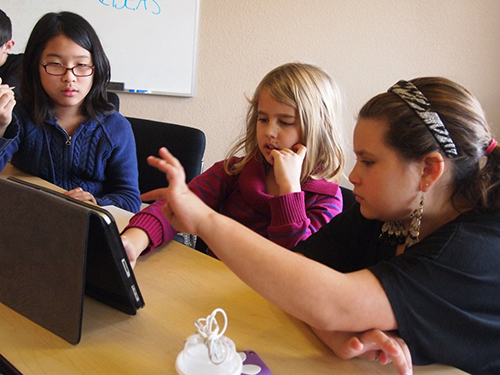Chapter 4: Responsibilities to Consider as Digital Citizens
Responsibilities to Consider as Digital Citizens

By Debra Lairson
When I first decided to venture into digital reading and writing with students, I held the reins the entire time, which was not something I had done in my traditional reading and writing workshops. I didn’t have faith that the kids would be able to do it alone. I didn’t have faith that the children needed to take the time away from their typical writing workshop to spend time digitally. I was a literacy coach though, so I needed to change my thinking for several reasons. As a leader in the district, I had to make sure that I was trying the things in my classroom that were being asked of the other teachers. I wanted to be able to support the teachers as they ventured out into the unfamiliar digital world.
When I began to dabble, I would use the computer and the projector to do shared reading or shared writing. I moved into interactive writing with a smart board, which was fun, but it was really just a substitution of what I had always done with an easel and chart paper. I was allowing myself to replace the chart paper with a digital tool, but I wasn’t at a place where I was ready to actually transform the learning experiences for my students. I didn’t think they were capable of doing such sophisticated work.
My opinion and my practice have changed. Just as children don’t need to know the alphabet before they can read, they don’t have to have spelling, or any of the other writing crafts or conventions under control before writing digitally. I had initially thought that writing digitally would be a way to publish the work that the children had created, so of course they would need to be able to spell everything correctly for their readers and have all of the necessary punctuation and voice that they needed in their writing. I’ve come to understand that writing is a process, whether composing digitally or with paper and pencil. As I began to venture into digital writing with my students, I realized we had a lot to think about.
Teacher Responsibility
The first responsibility that I had to consider was mine. I knew that I had a responsibility to my students to consider, reflect, think and grow as a digital literacy teacher. I began reading blogs and thinking about the practices of other teachers. I wanted to know the power and purpose of digital reading and writing. When I first began using these tools, I didn’t understand the potential that they had. I offered very little to my digital community. Since I wasn’t the kind of authentic digital community member that I wanted my students to be, I began to think about those that I followed who were. I studied what they did and how they did it and I began to create an idea of the type of digital citizen I wanted to be.
I realized that I had to start taking risks. I could not just read digitally if I wanted to be a part of a community. I needed to begin to comment on the posts that I was reading. I needed to take a stand on my own teaching and share what I was doing. I joined a digital community where I began to explore different tools, share my work and connect with other members. I attended classes and learned about what it meant to be a part of a digital community, both giving and taking from that community. I was leading the digital life that I wanted to make available to my students by participating in blogs, social networks and classes (both online and in person).
I was not where I wanted to be in knowledge and/or experience, but I had the responsibility to get started. I knew that I couldn’t wait until I felt comfortable or knew everything that I needed to know. This is especially true in the digital world. The minute you know something, it changes. I had to leave my comfort zone behind and get going.